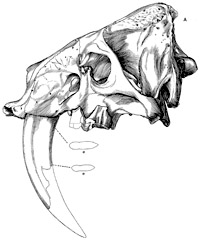Museum, University of Nebraska State

Bulletin of the University of Nebraska State Museum (1924–2023)
Date of this Version
1935
Document Type
Article
Citation
BULLETIN 42 VOLUME I MAY, 1935
Abstract
In February, 1932, while opening a gravel pit to get material for highway construction, the skull, tusks, and mandible of a new longirostral mastodont were found by Robert Arnold on his ranch, Sec. 24, T. 12 S., R. 22 W., 1 1/2 miles due east of Ogallah, Trego County, western Kansas. This point is located about 20 miles west and three miles north of Hays, the seat of the Fort Hays Kansas State College, in the museum of which the above mentioned specimen is mounted and exhibited. When unexpectedly exposed by Mr. Arnold and his associates, the great skull was perfect, and had one tusk in place with the other lying near by. The mandible likewise was complete throughout. The skull, jaw, and tusks were of ivory whiteness, and of substantial outward appearance, and gave little warning of their fragile nature. While they were undermining this great skull it collapsed, and the fragments were lost, with the exception of the larger pieces, such as the palatine region with the upper molars, and the very base of the skull with both occipital condyles.
Included in
Entomology Commons, Geology Commons, Geomorphology Commons, Other Ecology and Evolutionary Biology Commons, Paleobiology Commons, Paleontology Commons, Sedimentology Commons


Comments
Copyright © Nebraska State Museum. Used by permission.